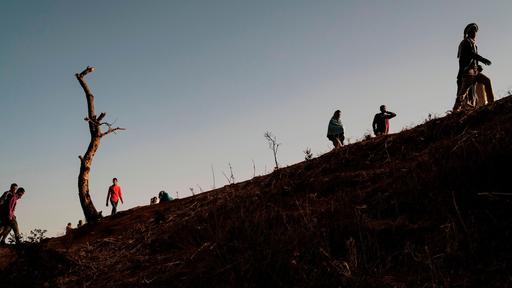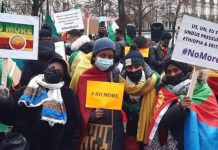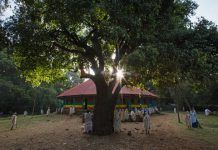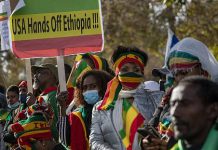Africa-Press-Ethiopia
“They set our crops on fire, then they started burning the homes,” said Gebru Habtom, a farmer in his 40s from the village of Debre Harmaz in Ethiopia. “Then they said they’d burn me next, so I fled for my life.”
Gebru, whose name has been changed to protect him from reprisals, was born and raised in the village of Debre Harmaz in central Tigray, some five miles from Ethiopia’s border with Eritrea. Like thousands of others, he has been displaced by Ethiopia’s months-long civil war.
Gebru connected with VICE World News from an undisclosed location along the Ethiopian-Sudanese border, and said that there was no sign of war or even resistance fighters present when, on January 10, Eritrean soldiers arrived in his village and went on a murderous rampage, pillaging and setting homes alight. “They shot at everyone, they even killed priests who were hiding in the church,” he said. Gebru also said that he heard about neighboring villages experiencing similar destruction that has also gone unreported.
“They shot at everyone, they even killed priests who were hiding in the church.”
Over the past month, VICE World News has documented harrowing testimony from nine displaced Tigrayans who recalled wanton slaughter, the destruction of crops and livelihoods, and tens of thousands fleeing from areas of Ethiopia’s Tigray region under Eritrean military control. Their testimony has been largely confirmed by satellite image analysis by the U.K.-based research organization DX Open Network, and their recounting and the image analysis both suggest that Eritrean soldiers involved in Ethiopia’s war in Tigray are ethnically cleansing communities near the Ethiopian-Eritrean border.
While several towns in the area have been previously reported destroyed, VICE World News found that, at minimum, an additional four villages in Tigray have likely been razed, and their inhabitants killed.
Eritrean soldiers first entered Ethiopia’s civil war to fight alongside the Ethiopian army against forces of Tigrayan People’s Liberation Front, known as TPLF, or the governing party in the region. In November, soldiers from the two countries succeeded in jointly pushing out Tigrayan forces from the regional capital, Mekelle, and have been accused by international organizations like Amnesty International and Human Rights Watch of brutal war crimes and indiscriminate shelling that targeted civilians and is believed to have left thousands dead.
Residents say that though Ethiopian prime minister Abiy Ahmed declared victory and the end of combat operations, Eritrean military units have continued attacking civilian areas, looting and killing before setting properties ablaze to render entire areas uninhabitable.
Now, Ethiopia claims it is conducting clean-up operations across parts of rural Tigray. Satellite imagery from central Tigray’s Eritrean border, however, points to something far more nefarious.
Like Debre Harmaz, the remote farming community of Adi Mendi, located three miles from Ethiopia’s border, also appears to have been destroyed. According to analysis by the DX Open Network, satellite imagery revealed that on January 19, some 478 structures, mostly tukul homes made from compressed straw, grass and mud, were set on fire. Tukul homes are common in farming communities across Ethiopia.
“Many of them were burnt alive in their homes.”
“Absence of scorching between blackened structures suggests intentional burning, not the result of a wildfire,” the DX Open Network said of the images in a statement to VICE World News. “Perpetrators likely went from structure to structure to initiate razing. And furthermore, there were no apparent indicators of any militarily valid targets.”






